UN human rights chief warns of ‘heightened risk of atrocity crimes’ in Gaza
The UN human rights chief has warned of a heightened risk of atrocity crimes in Gaza, urging parties involved to refrain from committing such violations.
“My humanitarian colleagues have described the situation as apocalyptic. In these circumstances, there is a heightened risk of atrocity crimes,” Volker Türk told reporters in Geneva, according to Reuters.
“Measures need to be taken urgently, both by the parties concerned and by all states, particularly those with influence, to prevent any such crimes.”
Key events
Warning sirens have sounded in Eilat, Israel’s southern resort and port city on the Red Sea.
While warning sirens in the north of Israel near the blue line boundary with Lebanon, and in the south in proximity to the Gaza Strip are a regular occurrence, it is rarer for a warning to sound in Eilat. The city has been targeted previously in this conflict by Yemen’s Houthi group, and also with a long-range attempted strike from inside Gaza.
Turkey’s president, who has been a vocal critic of Israel’s actions in Gaza, has told Turkish media that there would be serious consequences if Israel pressed ahead with a threat to attack Hamas officials on Turkish soil, and said his country has petitioned the international criminal court for Benjamin Netanyahu and other Israeli officials to be prosecuted for alleged war crimes in Gaza.
Recep Tayyip Erdoğan was speaking to journalists on a flight returning from Qatar on Tuesday, with the media in Turkey reporting the comments on Wednesday morning.
His comments echoed warnings from other Turkish officials on Tuesday in response to the head of Israel’s domestic security agency, Shin Bet, who said in an audio recording that his organization is prepared to destroy Hamas “in every place,” including inside Turkey.
On the legal moves, Erdoğan said “We brought the war crimes committed in Gaza to the court’s agenda and we will be following up on this. Netanyahu will not be able to evade paying the penalty for his actions. Sooner or later, he will be tried and will pay the price for the war crimes he committed”. Erdoğan has previously referred to Netanyahu as “the butcher of Gaza”.
Erdoğan also rejected comments made in Israel about the future of Gaza, saying that plans for a buffer zone conveyed by Israel to several Arab states and Turkey were disrespectful” to Palestinians.
Erdoğan said Gaza’s future after the war would be decided by Palestinian people and that Israel must return the territories it occupies. He also said western support for Israel, namely from the US, had caused the current situation in the region.
UN human rights chief warns of ‘heightened risk of atrocity crimes’ in Gaza
The UN human rights chief has warned of a heightened risk of atrocity crimes in Gaza, urging parties involved to refrain from committing such violations.
“My humanitarian colleagues have described the situation as apocalyptic. In these circumstances, there is a heightened risk of atrocity crimes,” Volker Türk told reporters in Geneva, according to Reuters.
“Measures need to be taken urgently, both by the parties concerned and by all states, particularly those with influence, to prevent any such crimes.”
The UK maritime trade operations agency has reported an incident involving a drone in the Red Sea, off the coast of Yemen.
The Iran-allied Houthi group has recently attacked shipping in the region in a bid to target Israeli interests.
The Israeli army has said the International Committee of the Red Cross must have access to the hostages still being held by Hamas in Gaza Strip.
“As the IDF expands its operations to dismantle Hamas in Gaza, we have not lost sight … of our critical mission to rescue our hostages,” the army spokesperson, Daniel Hagari said, Agence France-Presse reports.
“The international community must take action. The Red Cross must have access to the hostages that are in the hands of Hamas.”
Israel believes 138 of the estimated 240 people seized in Hamas’s attack on 7 October are being held in Gaza.
One hundred and five hostages were released during the recent temporary truce.
Israel has previously complained that one of the conditions of the ceasefire had been to allow the Red Cross access to hostages, which was not met by Hamas.
Last week, Rachel Goldberg, whose son is believed to be a hostage, said the Red Cross had done a good job “being the Uber service for the released hostages” but had done nothing for those still in captivity.
Tass reports that Vladimir Putin has arrived in Abu Dhabi. He is scheduled to hold talks with UAE president, Sheikh Mohammed bin Zayed Al Nahyan. The Russian leader will then travel to Riyadh for talks with the Saudi crown prince, Mohammed bin Salman.
Topics for discussion are anticipated to include the conflict in Gaza, as well as oil production policies.
The trip makes a rare foray outside Russia for Putin, who has had an international criminal court arrest warrant issued against him for his alleged role in the “unlawful deportation” of Ukrainian children.
In a separate development, Tass reports that the Russian foreign ministry spokesperson, Maria Zakharova, has announced that 883 Russians of about 1,100 who asked for help in evacuating from Gaza have arrived in Russia.
Here are some of the latest images sent to us over the news wires from Khan Younis, where there are reports today of a heavy bombardment and the movement of Israeli tanks into the city.

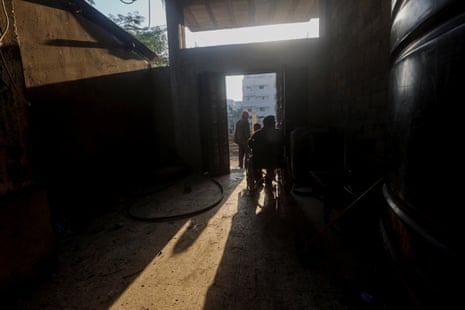
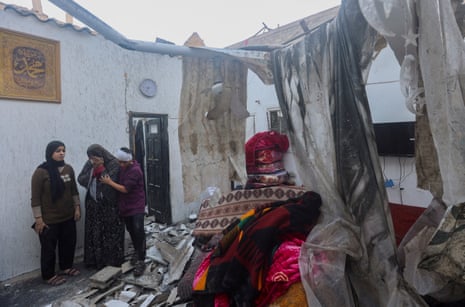
AFP reports that the streets of Khan Younis were almost empty on Wednesday morning as people tried to take shelter from shelling and artillery fire.
Hassan Al-Qadi, a displaced Khan Younis resident taking refuge in Rafah told the news agency:
The whole city is suffering from destruction and relentless shelling. Many people arriving from northern Gaza are facing dire circumstances. Many are homeless and some are searching for their missing children. We are not mere numbers. We are human beings.
Summary of the day so far …
It is 11.30am in Gaza City and in Tel Aviv. Here are the latest headlines …
-
Israeli forces have expanded their ground offensive inside Gaza to include its second-largest city, further shrinking the area where Palestinians can seek safety and halting the distribution of vital aid across most of the territory. Hamas and Islamic Jihad have told AFP their fighters were battling Israeli troops early on Wednesday in an effort to prevent them from breaking into Khan Younis, which local media reported was under heavy bombardment, with Israeli tanks approaching from the east.
-
Israel has told Palestinians that it will not allow the movement of civilians on the Salah al-Din road that runs through the Gaza Strip in sections north and east of Khan Younis. It is instead instructing residents evacuating from the north to use a diversion along a coastal route where it says the IDF will allow movement.
-
Israel’s military has said it struck at approximately 250 “terror targets” in the Gaza Strip over the last day, including targeting what it claimed was Hamas activity located at schools. Israeli forces have killed at least 16,248 people, including 7,112 children and 4,885 women, in Gaza since 7 October, a statement from the Hamas media office has said. At least 43,616 people have been injured and at least 7,600 people are missing, according to the statement on Tuesday.
-
Fuel and medical supplies are at critically low levels at al-Aqsa hospital in central Gaza due to road closures while hundreds of patients are being admitted every day, Doctors Without Borders (MSF) has said.
-
The UN’s top aid official has said the Israeli military campaign in southern Gaza has been just as devastating as in the north, creating “apocalyptic” conditions and ending any possibility of meaningful humanitarian operations. Martin Griffiths, the UN emergency relief coordinator, said he was speaking on behalf of the entire international aid community in saying the continuing offensive had robbed aid workers of any significant means of helping the 2.3 million people of Gaza.
-
Israeli prime minister, Benjamin Netanyahu, says the Israeli military will retain open-ended security control over the Gaza Strip long after its war against Hamas ends. In a news conference late Tuesday, Netanyahu said Gaza would have to remain demilitarized and that the only body capable of ensuring this would be the Israeli military.
-
Two Palestinians have been killed in clashes with the Israeli military in the West Bank, local media has reported.
-
The US president, Joe Biden, has denounced the reported rape and sexual violence committed against Israeli girls and women by Hamas militants during the 7 October attack on Israel, calling on the world to condemn such conduct “without equivocation” and “without exception.”
-
Israeli media is reporting that the health of Hanna Katzir, one of the hostages released by Hamas from Gaza last month, has deteriorated. Her daughter told army radio she had returned “both heartbroken and with cardiological problems”.
AFP reports, citing sources in Hamas and Islamic Jihad, that Palestinian fighters were battling Israeli troops early on Wednesday in an effort to prevent them from breaking into Khan Younis.
The report tallies with a statement by Israel’s army chief Herzi Halevi late on Tuesday that “our forces are now encircling the Khan Younis area in the southern Gaza Strip”.
Hani Mahmoud, reporting from Rafah for Al Jazeera, said: “As of the early hours of this morning, under heavy aerial bombardment, Israeli tanks started pushing deeper and deeper to the centre of Khan Younis city, coming from the eastern side.”
Pictures taken from southern Israel on Wednesday morning show smoke billowing over the Gaza Strip, and an Israeli Apache helicopter firing into Gaza.
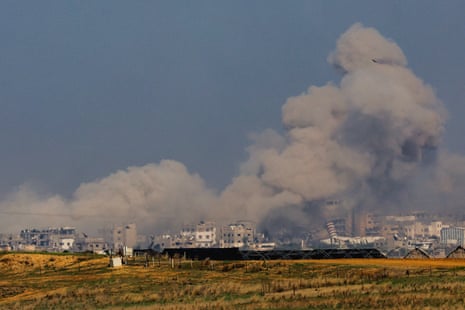
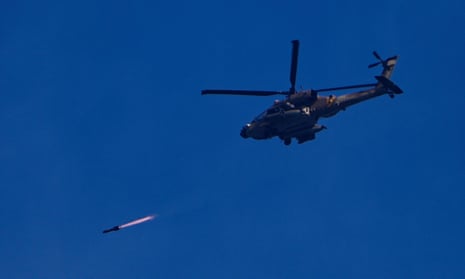
The Associated Press is carrying a couple of quotes from people in Rafah in the south of the Gaza Strip.
Hamza Abu Mustafa, a teacher who lives near a school-turned-shelter and is hosting three families, said “the situation is extremely dire.”
“You find displaced people in the streets, in schools, in mosques, in hospitals … everywhere.”
A woman who identified herself as Umm Ahmed said the harsh conditions and limited access to toilets were especially difficult for women who are pregnant or menstruating. “For women and girls, the suffering is double,” she said. “It’s more humiliation.”
Israeli media is reporting that the health of Hanna Katzir, one of the hostages released by Hamas from Gaza last month, has deteriorated.
The Times of Israel reports that on army radio, the daughter of the 77-year-old said: “My mother’s condition is serious, her condition has deteriorated following the captivity. She had no heart problems when she was kidnapped, but now she has severe heart problems due to harsh conditions and starvation. She came back both heartbroken and with cardiological problems.”
Katzir’s son Elad remains among those believed to be held in captivity by Hamas.
Hani Mahmoud has been reporting from Rafah in southern Gaza for Al Jazeera. He writes that in the past 12 hours, the Israeli military has intensified its attacks on the Jabaliya refugee camp in the north, describing it as “coordinated attacks by air, land, and sea in the densely populated area where thousands of people are still stranded”.
Mahmoud also reports that, driving around Rafah, he saw “on the walls of residential buildings, written statements of the names of people who were still under the rubble”.
He notes that “Civil defence crews … are unable to remove bodies from under the rubble. They lack the equipment and the machinery, and they rely on their hands to remove rubble.”
The Hamas-run health ministry in Gaza has previously said that more than 6,000 people are missing.
Here are some of the latest images sent to us from Gaza and Israel over the news wires.

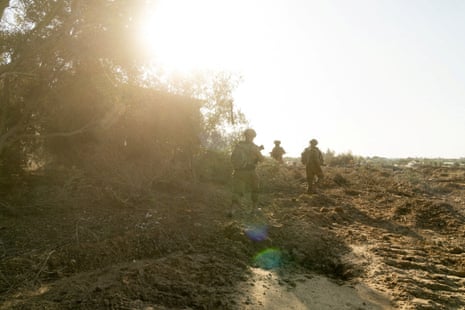

Reuters reports that Hamas’s armed wing has claimed it killed or wounded eight Israeli troops and destroyed 24 military vehicles on Tuesday. Separately the IDF has released the names of two soldiers it says were killed on Tuesday – one fighting in Gaza, it says, and the other in a car crash in southern Israel.
Israel has told Palestinians that it will not allow the movement of civilians down the Salah al-Din road that runs through the Gaza Strip in sections north and east of Khan Younis.
It is instead instructing residents evacuating from the north to use a diversion along a coastal route where it says the IDF will allow movement.
#عاجل سكان قطاع غزة، جيش الدفاع يتصرف بقوة ضد حماس والمنظمات الإرهابية في قطاع غزة وبشكل خاص في منطقة خان يونس.
فيما يلي عدة تعليمات عاجلة:
⭕️القتال والتقدم العسكري لجيش الدفاع في منطقة #خان_يونس لا يسمحان بتنقل المدنيين عبر محور صلاح الدين في المقاطع الواقعة شمالي وشرقي… pic.twitter.com/BTUT5dEohS
— افيخاي ادرعي (@AvichayAdraee) December 6, 2023
The UN has estimated that more than 75% of Gaza’s population has been internally displaced from this homes since Israel began its military campaign in the Gaza Strip.
The message from Israeli military spokesperson Avichay Adraee also states that “there will also be a local and temporary tactical suspension of military activities for humanitarian purposes” in one district from 10am (8am GMT) to 2pm (noon GMT).
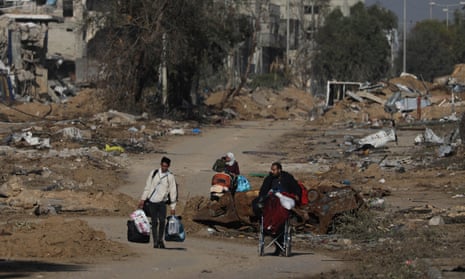
Israel’s military has issued its morning situational update, in which it claims to have struck at approximately 250 “terror targets” in the Gaza Strip.
On the Telegram messaging app, it wrote:
During these strikes, terrorists from the Hamas and Palestinian Islamic Jihad terrorist organizations were eliminated, and a number of terrorist infrastructure were destroyed.
It claims to have destroyed “an armed terrorist cell operating adjacent to a school in the northern Gaza Strip” and that “in an additional school in the northern Gaza Strip, weapons and ammunition were located”.
The claims have not been independently verified.
On Monday, an unnamed Israeli military official said the IDF believed that at least 15,000 Palestinians had been killed in Gaza since 7 October, of which it estimated 5,000 to be Hamas combatants.
Fuel and medical supplies running out at al-Aqsa hospital in central Gaza, Doctors Without Borders says
Fuel and medical supplies are at critically low levels at al-Aqsa hospital in central Gaza due to road closures while hundreds of patients are being admitted every day, Doctors Without Borders (MSF) has said.
The hospital, which we reported earlier received the bodies of 45 people killed on Tuesday from an Israeli strike on Deir al-Balah, according to its director, has been receiving between 150 and 200 wounded patients each day since the truce between Israel and Hamas ended on Friday, the aid agency said.
Marie-Aure Perreaut Revial, the MSF emergency coordinator in Gaza, said:
There are 700 patients admitted in the hospital now, with new patients arriving all the time. We are running out of essential supplies to treat them.
Shortages of medicine and fuel could result in the hospital being unable to provide life-saving surgeries or intensive care. Without electricity, ventilators would cease to function, blood donations would have to stop, the sterilisation of surgical instruments would be impossible.”
It is vital that the supply of humanitarian supplies is facilitated. The hospital urgently needs surgical sets, external fixators to hold broken bones together, and essential drugs, including drugs for chronic illnesses.
The agency called for an end to Israel’s siege on Gaza and for medical humanitarian supplies and aid to be allowed into the territory.
#Gaza: Fuel and medical supplies have reached critically low levels at Al-Aqsa hospital in the Middle Area of the Strip due to road closures, while hundreds of patients need emergency care due to the unrelenting Israeli bombardment…
— MSF International (@MSF) December 6, 2023
The release of Palestinian prisoners under the Israel-Hamas ceasefire agreement last week has touched nearly everyone in the occupied West Bank, where 750,000 Palestinians have been arrested since 1967, the AP reports.
In negotiations with Israel to free hostages in Hamas captivity in Gaza, the militant group has pushed for the release of high-profile prisoners. But experts say most Palestinians passing through Israel’s ever-revolving prison door are young men arrested in the middle of the night for throwing stones and firebombs in villages near Israeli settlements.
Nabi Saleh is one such village, long known for its grassroots protest movement. Israel’s crackdown affected the entire community, where parents come to learn, generation after generation, that they’re powerless to protect their children. Here’s an extract from AP’s report which you can read in full here:
For all Palestinian parents, Marwan Tamimi said, there comes a moment they realise they’re powerless to protect their children.
For the 48-year-old father of three, it came in June, when Israeli forces fired a large rubber bullet that struck the head of his eldest son, Wisam. A week later, Marwan said, soldiers came for the 17-year-old, dragging him out of bed with a fractured skull.
Wisam was charged with a range of offences he denied – throwing stones, possessing weapons, placing an explosive device and causing bodily harm – and sent to prison. Last Saturday, after six months behind bars, he returned home with 38 other Palestinians in exchange for Israeli hostages – part of a temporary ceasefire in the war that started after Hamas’ 7 October attack.
His parents said they hadn’t seen or heard from him in two months, since the war started. Wisam said he stayed in an overcrowded cell, was beaten and interrogated, and lacked food and medication.



